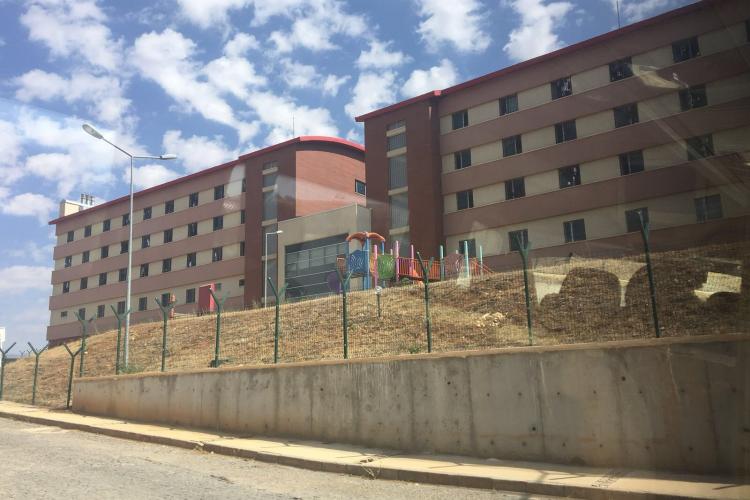Post by Hindpal Bhui, Mary Bosworth and Andriani Fili.
Over the course of this week, we report on an ongoing collaborative project on human rights monitoring in detention in Greece and Turkey. Funded through an ESRC-Impact Acceleration Account grant, this project has been ongoing since 2016. The project initially encompassed four countries that have seen especially high levels of migration since 2015: Greece, Turkey, Italy and Hungary. The first three are countries of first arrival, while Hungary was examined as a place of onward migration. In 2016-17, the research team visited each of the countries, was granted access to detention centres in Greece and Hungary, and interviewed staff from National Preventive Mechanisms (NPMs), NGOs, academics and international organisations that were involved in detention in all countries. The report on that stage of the research is available here.

In the initial phase of the project in 2016-2017, the team developed a reasonable understanding of detention in the research countries and established positive relationships with the Turkish and Greek NPMs. In 2018, the team was permitted to accompany these NPMs on several monitoring visits to immigration detention facilities. We sought to deepen our understanding of the structure and history of the NPMs, how they were monitoring immigration detention and what would help to improve the impact and outcomes of their work. Progress had been made in both countries. In Turkey in particular, the NPM – which had been inactive during our visit in 2016 – was now undertaking routine visits to detention sites across the country.
This project aims to contribute directly to the development of research-informed monitoring that can more effectively protect the dignity and rights of detained migrants. The study has also fostered direct engagement and exchange visits among practitioners and academics, encouraging critical reflection and development. Through various methods of dissemination, including briefing papers (here and here), blog posts, a workshop and documentary photography, the project has sought to forge new understanding of current practices in the countries under study. The project is now moving into a third phase,, funded by the Open Society Foundations. While the professional collaboration with Turkey and Greece will continue, more work is planned in Italy, which has a very active NPM and a network of NGOs working in detention and with former detainees. It is the only country of the initial four that has yet to allow access to sites of confinement.
Over the last few years we have visited a number of sites of detention, mainly in Greece but also in Turkey and Hungary. Most have been over-crowded and marked out by poor conditions. Those who are detained, often have little to no access to legal advice, visits, reliable medical care or indeed, to basic information. Centres have often held people who appeared to be unaccompanied children. Others held children with their families as a matter of course.
The challenges facing human rights monitors, under these circumstances, are legion. As part of the project, we have fostered contact between the NPMs and have also run training sessions in Greece. As the report makes clear, much work needs to be done. Funding continues to be a challenge for NPMs, as does their ability to influence policy and practice. The scale of detention in these countries relative to the size of the monitoring group is staggering. While in Greece, at any rate, NGOs play an important role in trying to fill some of the gaps (for instance by providing legal aid, and interpreters), in Turkey, NGOs are vulnerable to persecution and have had their actions curtailed.
We are currently, under the OSF project, developing the first ‘know your rights’ tool, for detainees in Greece, a document that, we hope, will be distributed in all sites of detention with links to further information. As part of this project we will also soon be launching an interactive map, which aims to visualise what goes on in detention centres in Greece and Italy in order to increase public access to knowledge about immigration and the treatment of immigrants in detention settings. The material disseminated through this platform draws on a large set of data obtained over different time periods and under a range of diverse projects and long-term engagement with civil society organisations. It is specifically designed to offer a platform to civil society organisations, solidarity groups, (ex) detainees and the public to communicate their experiences from detention.
As populations and politicians continue to demand hard borders and tough measures, the impact on vulnerable individuals is intense. Human rights monitors have an important role to play in mitigating some of the excesses of border politics, yet, this remains, a challenging field for all.
Read the final report of the project here.
Any comments about this post? Get in touch with us! Send us an email, or post a comment here or on Facebook. You can also tweet us.
__________
How to cite this blog post (Harvard style)
Bhui, H., Bosworth, M. and Fili, A. (2019) Monitoring Immigration Detention at the Borders of Europe. Available at: https://www.law.ox.ac.uk/research-subject-groups/centre-criminology/centreborder-criminologies/blog/2019/11/monitoring (Accessed [date]
Share:








